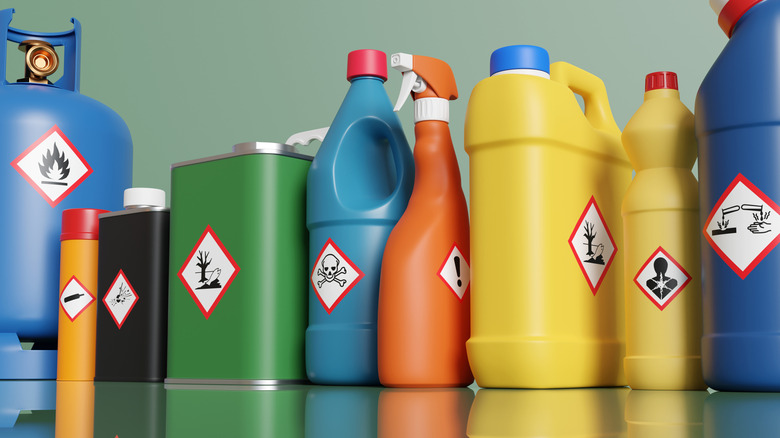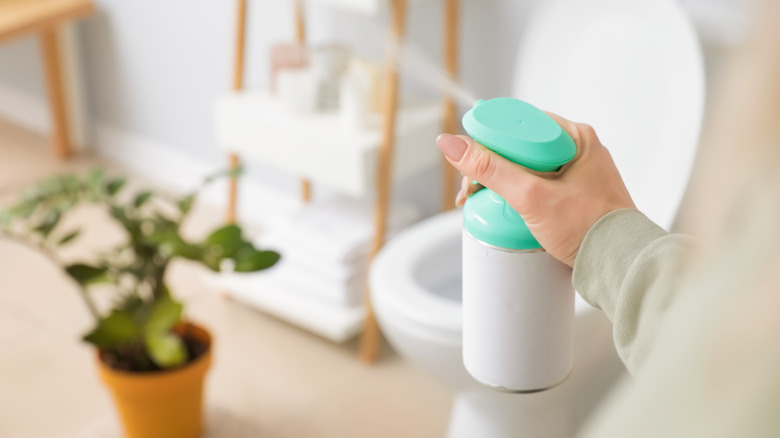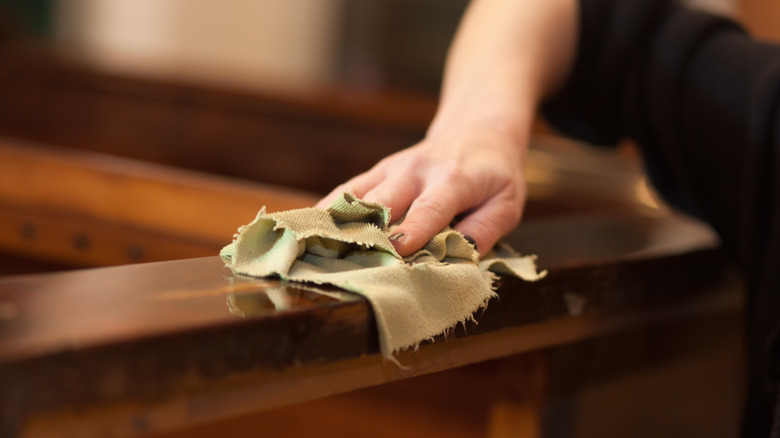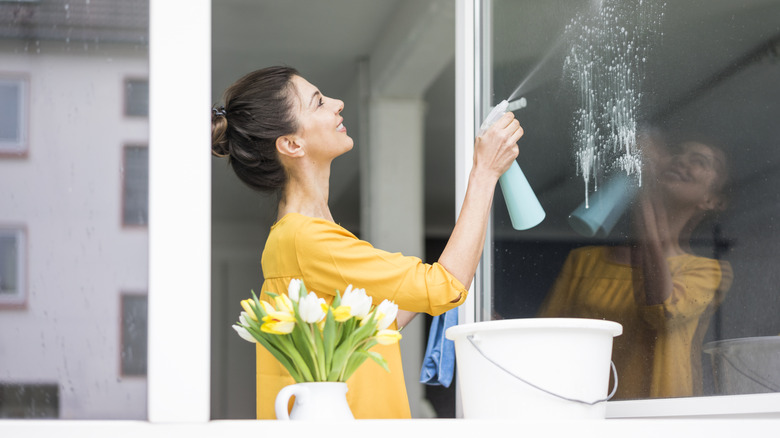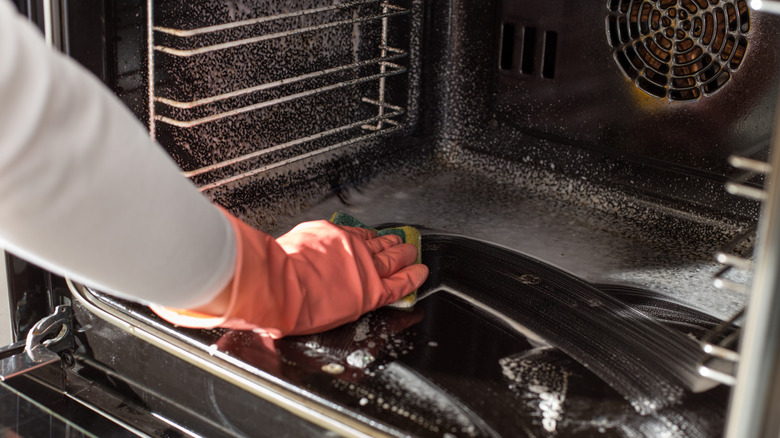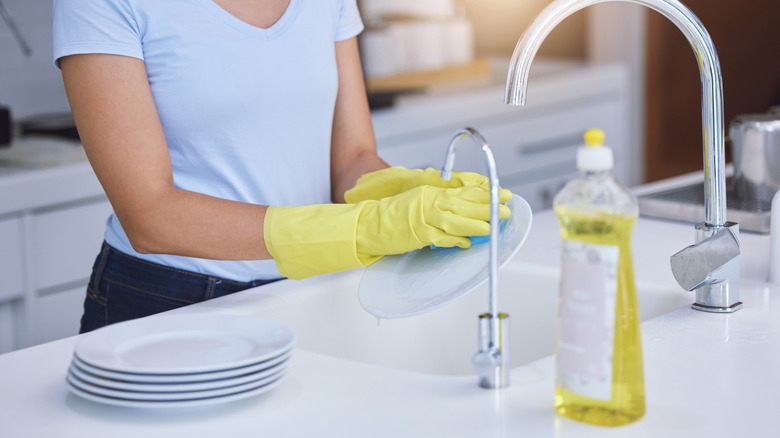5 Common Cleaning Products That Are Terrible For Your Health
We may receive a commission on purchases made from links.
Cleaning supplies have come a long way over the years, with many manufacturers foregoing harmful chemicals to create safer products for both people and the environment. There's also been an uptick in DIY cleaning hacks, with many of us trying homemade vinegar cleaning solutions or baking soda paste recipes. However, we still have a long way to go, and you could be using harmful cleaning supplies without realizing. Cleaning product manufacturers aren't required to list all of their ingredients on labels, and can even use misleading terms to confuse consumers.
Air freshener, furniture polish, window cleaner, oven cleaner, and even dish soap (!) are all common household products that the American Lung Association believes could impact your health. The reason many of these products have been flagged is because they contain hundreds of volatile organic compounds (VOCs). VOCs are gases that pollute the air in our homes. These gases can last long after the smell of the cleaning product dissipates, sometimes lingering for months at a time. They can also mix with other airborne gases, creating new chemicals. VOCs are known to cause headaches, respiratory issues, and gastrointestinal irritation in healthy individuals, and worsen symptoms for those with asthma or allergies. Those who work with cleaning products professionally can develop serious health issues such as cancer, lung disease, or reproductive issues. So for safety's sake, take a closer look at the following items in your cleaning closet.
Air freshener ... or should we say, air toxinator?
While some of the products on this list will be no surprise, you might not have expected air freshener to be among them. Most household products come with instructions to use in well-ventilated areas and avoid inhalation. However, air fresheners are often sprayed liberally and purposefully inhaled.
The startling truth is that many air fresheners emit toxins including VOCs, phthalates, and propellants. Inhaling air freshener once in a while is fine for most people, but if you have respiratory issues like asthma, it could cause an asthma attack. In those with allergies, air fresheners can cause irritation and headaches. Some evidence suggests that long-term inhalation can cause a hormonal imbalance and even affect your heart, specifically for those with lung disease. Most air fresheners come in aerosol cans which are highly flammable and bad for the environment. But even plug-ins and gels that disperse long-lasting fragrances can impact your health, since they require chemicals to make the scents linger.
Unlike disinfectants, that are necessary for killing germs and bacteria, air fresheners can easily be removed from your cleaning arsenal, and the American Lung Association urges to stop using them altogether. For a clean-smelling home, try a DIY lemon air freshener or a fragrant indoor plant, which has the added bonus of absorbing VOCs from the air.
Key ingredients in furniture polish can impact your long-term health
If your job entails regularly polishing furniture, you could be at risk of a myriad of health issues. Common furniture polishes release strong fumes that cause health risks with prolonged exposure. Like most cleaning products, furniture polish is poisonous if swallowed, it can irritate and burn skin if touched, and cause vision loss if in contact with the eyes. Many furniture polishes contain phenol and nitrobenzene, both of which are toxic if inhaled or absorbed by the skin, and also highly flammable. The latter ingredient, in cases of frequent exposure, is tied to risks of developing the blood condition methemoglobinemia. There have been studies done on whether it decreases fertility, and the cancer risk is not yet clear.
If using furniture polish, always read the directions and follow any safety advice, such as wearing protective gear or using it in a well-ventilated area. For increased safety, look for furniture polish made with fresh lemon juice, natural oils like olive, coconut, flaxseed and walnut, or beeswax, like this PIPIHUA Beeswax Polish and Conditioner.
Furniture polish will actually harm your furniture if used too frequently, so limit use to a light polish every few months. Dusting your wooden furniture regularly will also eliminate the need to polish as frequently and reduce the potential health risks that follow.
Window cleaner is not good for people with respiratory issues
Window cleaner can seem relatively harmless, at a glance: It doesn't have a strong odor, it doesn't come in an aerosol can, nor is it a powerful disinfectant. However, any chemical that is sprayed into the air is a health risk for those with respiratory issues. Spraying window cleaner into the air makes it easy to inhale and lingers, causing air pollution and creating secondary VOCs. Window cleaners can contain surfactants, solvents, fragrances, and dyes, all which produce airborne chemicals. Certain types of window cleaner also contain ammonia, which is extremely dangerous if mixed with bleach and could lead to hospitalization. This combination can occur accidentally if you are using a variety of cleaning products in the same room, so be sure to read labels to avoid an unsafe mix of chemicals.
Like most cleaning products, window cleaner is dangerous if swallowed and can cause blurred vision and damage if sprayed into the eyes. Want a safer, non-chemical, streak-free shine? Try cleaning your windows with one part water and two parts white vinegar.
Oven cleaner is even more toxic than you think
Oven cleaner is a more obvious addition to the list, but you may not realize just how dangerous it can be. If used correctly, oven cleaner is sprayed in ovens and left (with the door closed) for several hours while it eats away at grime and caked-on food. It is very corrosive and will cause serious burning of the skin if touched. Poison Control recommends wearing protective clothing, safety glasses and a face mask while using. If ingested, it can burn the inside of your mouth and your digestive tract, and will cause damage to your eye tissue if it makes contact. Even just inhaling oven cleaner can cause coughing or shortness of breath and chest pains, depending on the amount of exposure.
For a worry-free way to clean your oven, make a paste with baking soda and water and scrub with a soft cloth. Rinse using white vinegar or lemon juice. To remove stubborn food debris, you can steam clean an oven by placing an oven-safe bowl filled with water in an oven at 450 degrees F for a half-hour or more. Wipe away the loosened debris once the oven has fully cooled.
Dish soap is surprisingly bad for you
We saved dish soap for last because it was the biggest surprise. Soap — by its very nature! — is clean, right? We use it to protect against sickness! But dish soap also contains powerful chemicals to cut through grease and grime, disinfect, produce a streak-free shine, and smell good to boot. You might say dish soap is wearing a lot of chemical hats. These chemicals can include ethanolamines (known carcinogens), as well as dyes, phthalates, and formaldehyde. The problem is that dish soap doesn't entirely rinse off, leaving those chemicals where you least want them to be ... on your next meal.
The Environmental Working Group (EWG) conducted a study of over 300 dish soaps looking for toxins known to cause cancer, skin irritation or corrosion, respiratory toxicity, and more. The dish soaps were then awarded a grade from "A" to "F" (safest to most toxic). More than half of the dish soaps received a "D" or an "F," and included the most popular brands. The "A" dish soaps received an "EWG Verified" label and include smaller, boutique brands you probably haven't heard of. Sadly, some of the worst contenders use names that would make them sound like healthier options — including Nature's Promise Free and Clear Liquid Dish Detergent, which is free of dyes and fragrances, yet scored second to last in the study.
Products with "green" or "eco-friendly" labels don't mean the products are better for your health, only the environment. Look for products that also contain a "Safer Choice" seal, as these have a lower health risk.
